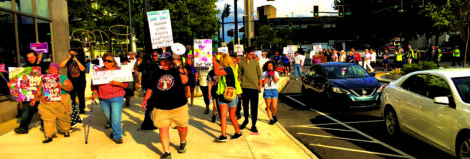City turns off speed cameras — for now
Youngstown official seeks quick resumption of school-zone enforcement
YOUNGSTOWN — City Law Director Jeff Limbian walked back his assurance that unmanned speed cameras would return to school zones once the Youngstown teachers strike was settled.
“Until council acts on the modification and Judge (Carla) Baldwin is satisfied that the requested changes are what she requested, the program will be temporarily stopped,” Limbian said Tuesday.
Limbian said in a Sunday Vindicator story that once the strike ended and children were back in school, the speed camera program would resume despite a dispute over how, or if, Youngstown Municipal Court would hold hearings on those contesting the citations.
Students returned to class Monday, two days after a tentative deal with the teachers union was reached. A one-year contract was ratified Monday. The strike began Aug. 23.
Asked what changed in the past few days, Limbian said Tuesday: “The mayor, as a courtesy, is giving Judge Baldwin a few days to feel comfortable with the amendments so that she can work on a procedure to hear these cases. It is my understanding that this temporary suspension of the program will be very temporary.”
Earlier Tuesday, police Chief Carl Davis said there are no plans to resume the use of the cameras until issues with the municipal court over hearing contested cases are addressed.
Davis said: “Do I know when that will happen? I don’t know. I wish I had an answer on that. We’re working to resolve some issues with the courts. As soon as that’s worked out, we’ll be back up and good to go.”
Davis added: “Until the court issue is resolved, we’re in a holding pattern. We’re working to get it resolved and get the cameras operating again.”
TIME FOR REVIEW
On the agenda for today’s city council meeting is legislation, sponsored by Mayor Jamael Tito Brown, to modify language of the ordinance approved Nov. 15 to establish the policy for unmanned speed cameras in school zones.
But court Administrator David Magura Jr. said in Sunday’s article that nothing will change even if city council approves the legislation. Court officials want more time to review the proposed changes, and they have other concerns not included in the ordinance, Magura said.
In a Sept. 11 email, Magura wrote:”Rushing this process without due diligence could lead to unintended consequences and complications in our operations,” and the administration’s proposal “does not offer a comprehensive analysis of the potential ramifications on our docket and operations.”
NO APPEALS HEARD
At issue is the court’s decision not to hear any appeals of speed camera citations because of concerns its officials have with the policy.
That has resulted in anyone filing an appeal to a citation being in limbo as cases aren’t been heard or even scheduled by the court. There are about 300 appeals from those getting citations, Limbian said.
The primary changes in the proposed ordinance are the court would be able to charge “the applicable court costs and fees for such a civil action to the party that does not prevail in the action” and requires those with default judgments to enter a motion with the court rather than the police chief or designee within one year of the date of entry of the default judgment.
Limbian said in Sunday’s article that he was “frankly disappointed and confused that minor issues could derail this program.”
Baldwin, the court’s administrative and presiding judge, in an April 4 letter to Limbian, Davis and Brown listed what she sees as shortcomings in the legislation. That included no details on affidavits filed by those who had their vehicle or license plates stolen and received citations, no relief for companies that lease or rent vehicles, the lack of affidavits with corporate entities, court costs and “mechanical difficulties” such as default judgments when a person fails to appear but later is able to show good cause why that happened.
Magura also said it hasn’t been decided who would accept payments during disputed citation cases: the court or Blue Line Solutions, a Chattanooga, Tenn., company that runs the program and gets 35 percent of all citation revenue.
SCHOOL ZONES
Since the program started being phased in Feb. 21, 22,424 speeding citations have been issued in school zones, according to Lt. Robert Gentile, head of the police department’s accident investigation and traffic unit. The program stopped when the school year ended in May.
Cameras were in use on school days from the time children headed to class until 6 p.m. They weren’t used on weekends, during the summer and on days when class was not in session.
During the two hours in the morning that kids go to school, and the two hours when they leave, the speed limit in those zones are 20 mph. In between and after school ends, the speed limit is between 25 and 35 mph depending on the location.
Even though the cameras are not issuing citations, the speed motorists travel through school zones flashes on signs in those areas.
With no apparent penalty for not paying citations, the collection rate is low. Fewer than 20 percent of those cited have paid the penalties.
Motorists caught going at least 11 mph over the speed limit and up to 14 mph over it face a civil penalty of $100. Those going 15 to 20 mph over the limit face a $125 penalty and those traveling faster than 20 mph over the limit face a $150 penalty. They do not get points on their driving record for the citations.
The city gets 65 percent of the money collected and has received $284,912 in paid speed citations, said Finance Director Kyle Miasek.
With Blue Line’s 35 percent equaling $153,414, a total of $438,326 has been paid in citations.
Even at the minimum $100 penalty, that would mean fewer than 4,400 of the 22,424 citations issued have been paid.
Under state law that restricts the use of speed cameras, Youngstown will be able to use its share of the fines for only school safety resources, such as improvements to school zones and crosswalks, and possibly sidewalks, near those buildings.
The city has spent none of the money to date.




